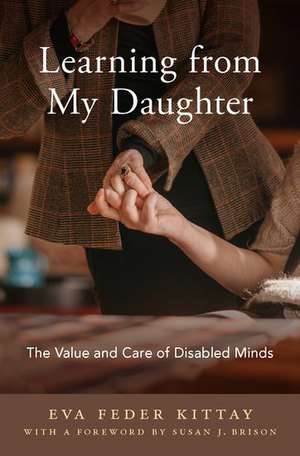Learning from My Daughter: The Value and Care of Disabled Minds
Autor Eva Feder Kittayen Limba Engleză Hardback – 6 iun 2019
Preț: 370.82 lei
Nou
Puncte Express: 556
Preț estimativ în valută:
70.96€ • 75.88$ • 59.16£
70.96€ • 75.88$ • 59.16£
Carte disponibilă
Livrare economică 27 martie-10 aprilie
Preluare comenzi: 021 569.72.76
Specificații
ISBN-13: 9780190844608
ISBN-10: 0190844604
Pagini: 304
Dimensiuni: 165 x 239 x 33 mm
Greutate: 0.52 kg
Editura: Oxford University Press
Colecția OUP USA
Locul publicării:New York, United States
ISBN-10: 0190844604
Pagini: 304
Dimensiuni: 165 x 239 x 33 mm
Greutate: 0.52 kg
Editura: Oxford University Press
Colecția OUP USA
Locul publicării:New York, United States
Recenzii
Kittay provides an excellent read in disability theory and philosophy and offers clarity and persistence in addressing very tough questions.
Learning From My Daughter has much to recommend it. Kittay is, as always, incisive, and Learning From My Daughter is both eloquently argued and replete with hard-won insight. It ought to attract a wide readership both within and beyond the academy.
Eva Feder Kittay's is a thought-provoking book on humility, choosing children, and the place of care in philosophy and disability. It recently [2020] won the prestigious PROSE Award for Philosophy. This book deserves a wide readership both in and beyond philosophy...it will constitute a significant resource for philosophers of disability and philosophers more generally.
Eva Feder Kittay's Learning from My Daughter is, in my view, her best work to date. As I read, I felt I was being guided through a varied terrain — some of it familiar, some unfamiliar — by someone who is much wiser than I am. Kittay's experience — of loving and caring for both a daughter with severe cognitive and physical disabilities and a son who is not disabled motivates and informs the book in crucial ways, while her philosophical mastery allows her to think through and convey with clarity the insights that this experience yields.
Very few philosophers since Plato have thought about disability so productively and generatively as has Eva Kittay. And very few scholars of disability have so enriched the study of philosophy as has Eva Kittay. Learning from My Daughter is a remarkable book, one that I know I will return to again and again in my intellectual journeys. It should be required reading for anyone who wants to think seriously about what makes us human.
Eva Kittay's work on disability is at once both philosophically astute and deeply moving. She writes with the skill of a careful thinker and the passion of a mother, and her perspective on disability is invaluable.
The advent of a new book from Eva Kittay fills me with gratitude and excitement: the clarity of her thinking and the wisdom of her heart mean that these arguments will be welcomed, puzzled over, disputed with, and treasured for many years to come.
Learning From My Daughter has much to recommend it. Kittay is, as always, incisive, and Learning From My Daughter is both eloquently argued and replete with hard-won insight. It ought to attract a wide readership both within and beyond the academy.
Eva Feder Kittay's is a thought-provoking book on humility, choosing children, and the place of care in philosophy and disability. It recently [2020] won the prestigious PROSE Award for Philosophy. This book deserves a wide readership both in and beyond philosophy...it will constitute a significant resource for philosophers of disability and philosophers more generally.
Eva Feder Kittay's Learning from My Daughter is, in my view, her best work to date. As I read, I felt I was being guided through a varied terrain — some of it familiar, some unfamiliar — by someone who is much wiser than I am. Kittay's experience — of loving and caring for both a daughter with severe cognitive and physical disabilities and a son who is not disabled motivates and informs the book in crucial ways, while her philosophical mastery allows her to think through and convey with clarity the insights that this experience yields.
Very few philosophers since Plato have thought about disability so productively and generatively as has Eva Kittay. And very few scholars of disability have so enriched the study of philosophy as has Eva Kittay. Learning from My Daughter is a remarkable book, one that I know I will return to again and again in my intellectual journeys. It should be required reading for anyone who wants to think seriously about what makes us human.
Eva Kittay's work on disability is at once both philosophically astute and deeply moving. She writes with the skill of a careful thinker and the passion of a mother, and her perspective on disability is invaluable.
The advent of a new book from Eva Kittay fills me with gratitude and excitement: the clarity of her thinking and the wisdom of her heart mean that these arguments will be welcomed, puzzled over, disputed with, and treasured for many years to come.
Notă biografică
Eva Feder Kittay was Professor of Philosophy at Stony Brook University for over 35 years. She has authored and edited collections as well as numerous articles in the philosophy of language, feminist philosophy, and disability studies. Her pioneering work interjecting questions of care and disability (especially cognitive disability) into philosophy and her work in feminist theory have garnered numerous honors and prizes: the 2003 Woman Philosopher of the Year by the Society for Women in Philosophy, the inaugural prize of the Institut de Mensch, Ethik und Wissenschaft, the Lebowitz prize from the American Philosophical Association and Phi Beta Kappa, a Lifetime Achievement Award from the Center for Discovery, an NEH Fellowship, and a Guggenheim Fellowship. She is the parent of a daughter with very significant disabilities.
